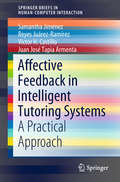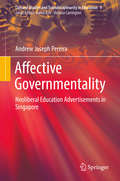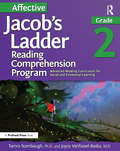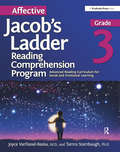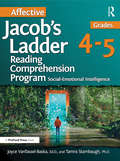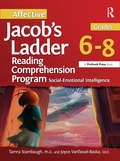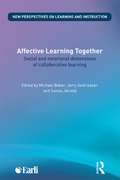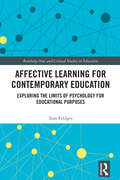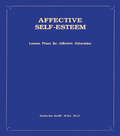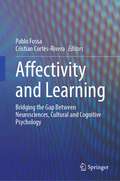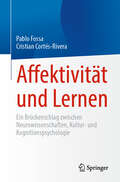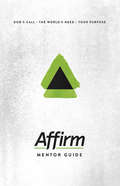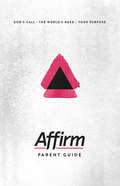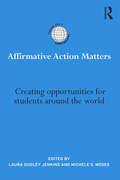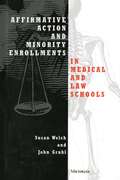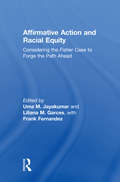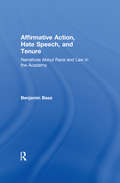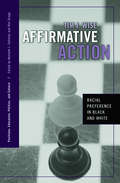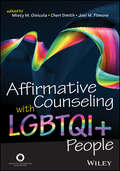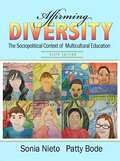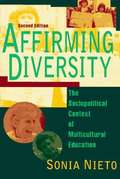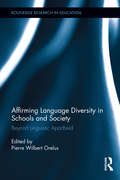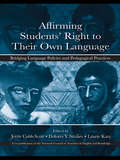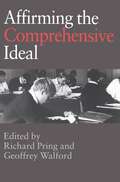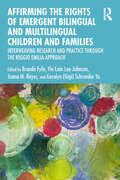- Table View
- List View
Affective Feedback in Intelligent Tutoring Systems: A Practical Approach (Human–Computer Interaction Series)
by Samantha Jiménez Reyes Juárez-Ramírez Victor H. Castillo Juan José Tapia ArmentaAffective components are as important as cognitive components in tutoring assisted learning process. Feedback from tutors is essential in keeping students motivated. Affectivity and motivation are also significant in computer-based tutoring systems. However, several educational frameworks do not include this kind of interaction between students and tutoring systems. In those cases, the students learning interest and motivation to learn could be negatively affected, and student profits from the system could be impoverished. This is why tutoring systems need to provide direct and affective interaction with students; it can encourage them and increase the motivation to learn. This book introduces a broad range of topics in affective learning in computer-based systems. The text offers a deep conceptual background, covering relevant concepts of affectivity, feedback and motivational components in learning environments. It describes the design of a proposed model for providing affective feedback, the mathematical validation of the conceptual model and its implementation. Moreover, it presents an analysis of the impact of the affective feedback on student motivation to learn. Finally, the book offers research perspectives of the impact and applicability of the affective feedback in computer-based tutoring environments. Affective Feedback in Intelligent Tutoring Systems can be used by human tutors who want to include motivational and affective elements in the learning process, researchers in Human-Computer Interaction and Education and by software developers who want to develop learning systems using these elements.
Affective Governmentality: Neoliberal Education Advertisements in Singapore (Cultural Studies and Transdisciplinarity in Education #9)
by Andrew Joseph PereiraThis book investigates the subjectivities in education arising from the triumphant mobilisation of care as portrayed in educational advertisements, and provides a novel theory of affective governmentality based on empirical research on affect, neoliberalism, and governmentality. It also takes the bold step of encouraging the re-imagination of the central and pressing question of school marketisation in Singapore, and problematises the seemingly innocuous portrayals of care in light of neoliberal governmentality seeking to perform cultural work on preferred identities and subjectivities. Using a judicious selection of media artefacts, the book scrutinises the creation of emotional technologies through an ethic of caring, harnessing vulnerabilities and triumphalism. As such it not only equips readers to understand the role of emotional technologies but also offers a critical and alternative view of hope and aspirations for transforming society.
Affective Jacob's Ladder Reading Comprehension Program: Grade 2
by Tamra Stambaugh Joyce VanTassel-BaskaThe Affective Jacob's Ladder Reading Comprehension Program uses a models approach to scaffold student learning and promote inquiry-based discussions of texts. This series of Jacob's Ladder: Focuses specifically on supporting advanced students' social-emotional needs. Includes high-interest reading selections in the following genres: short stories and media, poetry, and biographies. Moves students from lower to higher level skills of self-awareness, metacognition, and goal setting. Integrates reading comprehension and analysis skills with affective and social-emotional needs. Asks students to apply themes, character or real-life experiences, and lessons from texts to their own lives. New ladders were specially designed for this series and derived from relevant theories about empathy, risk and resilience, achievement motivation, and mindsets and practices for cultivating talent. The Affective Jacob's Ladder guides provide teachers with an explanation of the nature and substance of the theoretical constructs for each ladder. Also included are an overview of the goals and objectives of each ladder and suggestions for how to implement the ladders in the classroom in a way that supports students' academic and social-emotional needs at the same time. Optional Student Workbooks In addition to this teacher's guide, companion student workbooks are available for Picture Books, Short Stories and Media, and Poetry and Biographies. The student workbooks feature ample room for student responses and notes, make reviewing and providing feedback on student work easier than ever, provide students with an easy-to-use reference to use during discussions, and save time, as there is no need to reproduce student handouts.
Affective Jacob's Ladder Reading Comprehension Program: Grade 3
by Tamra Stambaugh Joyce VanTassel-BaskaThe Affective Jacob's Ladder Reading Comprehension Program uses a models approach to scaffold student learning and promote inquiry-based discussions of texts. This series of Jacob's Ladder: Focuses specifically on supporting advanced students' social-emotional needs. Includes high-interest reading selections in the following genres: short stories and media, poetry, and biographies. Moves students from lower to higher level skills of self-awareness, metacognition, and goal setting. Integrates reading comprehension and analysis skills with affective and social-emotional needs. Asks students to apply themes, character or real-life experiences, and lessons from texts to their own lives. New ladders were specially designed for this series and derived from relevant theories about empathy, risk and resilience, achievement motivation, and mindsets and practices for cultivating talent. The Affective Jacob's Ladder guides provide teachers with an explanation of the nature and substance of the theoretical constructs for each ladder. Also included are an overview of the goals and objectives of each ladder and suggestions for how to implement the ladders in the classroom in a way that supports students' academic and social-emotional needs at the same time. Optional Student Workbook Packs In addition to this teacher's guide, companion student workbooks are available for Picture Books, Short Stories and Media, and Poetry and Biographies. The student workbooks feature ample room for student responses and notes, make reviewing and providing feedback on student work easier than ever, provide students with an easy-to-use reference to use during discussions, and save time, as there is no need to reproduce student handouts.
Affective Jacob's Ladder Reading Comprehension Program: Grades 4-5
by Tamra Stambaugh Joyce VanTassel-BaskaThe Affective Jacob's Ladder Reading Comprehension Program uses a models approach to scaffold student learning and promote inquiry-based discussions of texts. This series of Jacob's Ladder: Focuses specifically on supporting advanced students' social-emotional needs.Includes high-interest reading selections in the following genres: short stories and media, poetry, and biographies.Moves students from lower to higher level skills of self-awareness, metacognition, and goal setting.Integrates reading comprehension and analysis skills with affective and social-emotional needs.Asks students to apply themes, character or real-life experiences, and lessons from texts to their own lives. New ladders were specially designed for this series and derived from relevant theories about empathy, risk and resilience, achievement motivation, and mindsets and practices for cultivating talent. The Affective Jacob's Ladder guides provide teachers with an explanation of the nature and substance of the theoretical constructs for each ladder. Also included are an overview of the goals and objectives of each ladder and suggestions for how to implement the ladders in the classroom in a way that supports students' academic and social-emotional needs at the same time. Optional Student Workbook Packs In addition to this teacher's guide, companion student workbooks are available for Short Stories and Media, Poetry, and Biographies, Essays and Speeches. The student workbooks feature ample room for student responses and notes, make reviewing and providing feedback on student work easier than ever, provide students with an easy-to-use reference to use during discussions, and save time, as there is no need to reproduce student handouts.
Affective Jacob's Ladder Reading Comprehension Program: Grades 6-8
by Tamra Stambaugh Joyce VanTassel-BaskaThe Affective Jacob's Ladder Reading Comprehension Program uses a models approach to scaffold student learning and promote inquiry-based discussions of texts. This series of Jacob's Ladder: Focuses specifically on supporting advanced students' social-emotional needs.Includes high-interest reading selections in the following genres: short stories and media, poetry, and biographies.Moves students from lower to higher level skills of self-awareness, metacognition, and goal setting.Integrates reading comprehension and analysis skills with affective and social-emotional needs.Asks students to apply themes, character or real-life experiences, and lessons from texts to their own lives. New ladders were specially designed for this series and derived from relevant theories about empathy, risk and resilience, achievement motivation, and mindsets and practices for cultivating talent. The Affective Jacob's Ladder guides provide teachers with an explanation of the nature and substance of the theoretical constructs for each ladder. Also included are an overview of the goals and objectives of each ladder and suggestions for how to implement the ladders in the classroom in a way that supports students' academic and social-emotional needs at the same time. Optional Student Workbook Packs In addition to this teacher's guide, companion student workbooks are available for Short Stories and Media, Poetry and Song Lyrics, and Biographies, Essays, and Speeches. The student workbooks feature ample room for student responses and notes, make reviewing and providing feedback on student work easier than ever, provide students with an easy-to-use reference to use during discussions, and save time, as there is no need to reproduce student handouts.
Affective Learning Together: Social and emotional dimensions of collaborative learning (New Perspectives on Learning and Instruction)
by Michael Baker Jerry Andriessen Sanna JärveläIn the twenty-first century, being able to collaborate effectively is important at all ages, in everyday life, education and work, within and across diverse cultural settings. People are increasingly linked by networks that are not only means for working and learning together, but are also ways of maintaining social and emotional support. Collaborating with others requires not only elaborating new ideas together, but also being able to manage interpersonal relations. In order to design and facilitate effective collaborative situations, the challenge is therefore to understand the interrelations between social, affective and cognitive dimensions of interactions in groups. Affective Learning Together contains in-depth theoretical reviews and case studies of group learning in a variety of educational situations and taught disciplines, from small groups working in the secondary school classroom, to teams of medical students and more informal working groups at university level. Contributors provide detailed analyses of the dynamics of interpersonal relations and affects, in relation with processes of meaning and knowledge elaboration, including discussion of: the variety of social learning situations and experiences; social identities in group learning; emotion, motivation and knowledge elaboration; conflict, arguments and interpersonal tensions in group learning. Bringing together a broad range of contributions from internationally recognised researchers who are seeking to broaden, deepen and integrate the field of research on collaborative learning, this book is essential reading for all serious students of contemporary educational research and practice.
Affective Learning for Contemporary Education: Exploring the Limits of Psychology for Educational Purposes (Routledge New and Critical Studies in Education)
by Tom FeldgesThis book dissects the relationship between the disciplines of Psychology and Education Studies to provide a new and critical perspective on the usefulness of psychological research and theory for educational purposes.Assuming that affective states form an important part of how humans relate to their environment, this book posits that the currently dominant cognitive approach to the field of psychology is unable to account sufficiently for this experiential reality of human life. Providing a philosophical investigation of this disparity, chapters offer an in-depth discussion of affective states for transformative learning, chart the journey of Psychology as an independent academic discipline, and engage classical learning theories in order to offer a broader understanding of complex, field-specific arguments, and engage readers from multidisciplinary backgrounds. Provoking a true paradigm shift in the field of Education Studies based on its own theoretical underpinnings, this book ultimately initiates a partnership between both disciplines to demonstrate a progressive and radical approach to the way we teach and think about the field of education studies.This cutting-edge book will be of relevance to scholars, researchers, and postgraduate students in the fields of Education Studies, educational psychology, the theory of education, and the philosophy of education more broadly. Senior professionals and academics who wish to expand their knowledge in relation to the international literature of this field would further benefit from this volume more broadly.
Affective Self-Esteem: Lesson Plans For Affective Education
by Katherine KrefftFirst published in 1993. Routledge is an imprint of Taylor & Francis, an informa company.
Affectivity and Learning: Bridging the Gap Between Neurosciences, Cultural and Cognitive Psychology
by Pablo Fossa Cristian Cortés-RiveraThis book presents an interdisciplinary approach to the study of affectivity and human learning by bridging the gap between neuroscience, cultural and cognitive psychology. It brings together studies that go beyond the focus on cognitive-intellectual variables involved in learning processes and incorporate the study of the role played by affectivity and emotions in learning not only at educational settings but in all processes of transformation and human development, thus presenting affectivity as a catalyst and mediator of all daily learning processes.Chapters brought together in this contributed volume present both theoretical contributions and results of empirical research from different disciplines, such as neuroscience, cognitive psychology, cultural psychology, educational psychology, developmental psychology and philosophy, and are grouped into five thematic sections. The first part of the book brings together chapters discussing different aspects of the role played by affectivity in learning processes from the perspectives of cultural, educational and developmental psychology. The second part is dedicated to the role of affectivity for teachers during their training as educators and during their pedagogical practice in diverse contexts. The third part focuses on the relationship between affectivity and learning from a neuroscientific point of view. The fourth part discusses affectivity and learning in therapeutic and clinical contexts. Finally, the fifth part brings together chapters about affectivity and learning in everyday life.By bringing together this rich interdisciplinary collection of studies, Affectivity and Learning: Bridging the Gap Between Neurosciences, Cultural and Cognitive Psychology will be a valuable resource for researchers in the fields of psychology, neuroscience and education, as well as for educators and teachers interested in knowing more about the relationship between affectivity and human learning.
Affektivität und Lernen: Ein Brückenschlag zwischen Neurowissenschaften, Kultur- und Kognitionspsychologie
by Pablo Fossa Cristian Cortés-RiveraDieses Buch zeigt einen interdisziplinären Ansatz zur Untersuchung der Affektivität beim menschlichen Lernen und überbrückt dabei die Kluft zwischen Neurowissenschaften, Kultur- und Kognitionspsychologie. Es vereint Studien, die über den Fokus auf kognitiv-intellektuelle Variablen, die in Lernprozesse involviert sind, hinausgehen und die Untersuchung der Rolle von Affektivität und Emotionen beim Lernen nicht nur in Bildungssettings, sondern in allen Prozessen der Transformation und der menschlichen Entwicklung einbeziehen. Dazu wird Affektivität als Katalysator und Vermittler von täglichen Lernprozessen kritisch hinterfragt und im interkulturellen Diskurs betrachtet.Die Kapitel dieses Beitragswerkes präsentieren sowohl theoretische wie auch empirische Forschung aus verschiedenen Disziplinen wie Neurowissenschaften, kognitiver Psychologie, Kulturpsychologie, pädagogischer Psychologie, Entwicklungspsychologie und Philosophie und sind in fünf thematische Abschnitte gegliedert. Der erste Teil des Buches enthält Kapitel, in denen verschiedene Aspekte der Affektivität bei Lernprozessen aus der Sicht der Kultur-, Bildungs- und Entwicklungspsychologie erörtert werden. Der zweite Teil widmet sich der Affektivität in Bezug auf Lehrkräfte während ihrer Ausbildung und während ihrer pädagogischen Praxis in verschiedenen Kontexten. Der dritte Teil befasst sich mit der Beziehung zwischen Affektivität und Lernen aus neurowissenschaftlicher Sicht. Der vierte Teil befasst sich mit Affektivität und Lernen in therapeutischen und klinischen Kontexten. Der fünfte Teil fasst Kapitel über Affektivität und Lernen im Alltag zusammen.Durch die Zusammenstellung dieser reichhaltigen interdisziplinären Sammlung von Studien wird Affektivität und Lernen: Der Brückenschlag zwischen Neurowissenschaften, Kultur- und Kognitionspsychologie eine wertvolle Quelle für Forscher in den Bereichen Psychologie, Neurowissenschaften und Bildung sowie für Erzieher und Lehrer, diemehr über die Beziehung zwischen Affektivität und menschlichem Lernen erfahren möchten.Die Übersetzung wurde mit Hilfe von künstlicher Intelligenz durchgeführt. Eine anschließende menschliche Überarbeitung erfolgte vor allem in Bezug auf den Inhalt.
Affirm Mentor Guide: God's Call/The World's Need/Your Purpose
by Jen Bradbury Sara Galyon Audrey Elizabeth WilderAffirm is a one-of-a-kind resource that aims to help teens take the next steps in following Jesus after making their initial commitment of faith.With the Affirm mentor guide, you will be equipped to be a trusted guide that helps students along this path. Being a disciple of Jesus can be incredible, but it can also be challenging. None of us can do it alone and we all need mentors along the way.
Affirm Parent Guide: God's Call/The World's Need/Your Purpose
by Jen Bradbury Sara Galyon Audrey Elizabeth WilderThe journey of faith is spectacular, full of wonder and discovery, but it is also challenging, filled with questions and doubt. This is doubly true for teens who navigate the journey of discovering their faith, while simultaneously discovering themselves. As teens change and grow, so does their faith.Affirm recognizes the difficulties and anxieties that emerge from raising a young person to be faithful. In response, the Affirm Parent Guide provides parents will the tools to be companions to their teens on this journey. As a parent, you’ll be invited to reflect on your own faith, so that you can help them as they learn about their own. The Affirm Parent Guide is full of helpful tips and activities to use as you both strive to grow in your faith and deepen your relationship with Christ.
Affirmative Action Matters: Creating opportunities for students around the world (International Studies in Higher Education)
by Michele S. Moses Laura Dudley JenkinsAffirmative Action Matters focuses specifically on affirmative action policies in higher education admissions, the sphere that has been the most controversial in many of the nations that have such policies. It brings together distinguished scholars from diverse nations to examine and discuss the historical, political and philosophical contexts of affirmative action and clarify policy developments to further the meaningful equality of educational opportunity. This unique volume includes both well established and emerging policies from the Americas, Europe, Africa, and Asia, policies which developed under a variety of political systems and target a range of underrepresented groups, based on race, ethnicity, gender, class, social background, or region. Accessible and thought provoking case studies of affirmative action demonstrate that such policies are expanding to different countries and target populations. While some countries, such as India, have affirmative action policies that predate those in the United States, affirmative action is a recent development in countries such as Brazil and France. Legal or political pressures to move away from explicitly race-based policies in several countries have complicated affirmative action and make this assessment of international alternatives particularly timely. New or newly modified policies target a variety of disadvantaged groups, based on geography, class, or caste, in addition to race or sex. International scholars in six countries spanning five continents offer insights into their own countries’ experiences to examine the implications of policy shifts from race toward other categories of disadvantage, to consider best practices in student admission policies, and to assess the future of affirmative action.
Affirmative Action and Minority Enrollments in Medical and Law Schools
by Susan Welch John GruhlAffirmative action is one of the central issues of American politics today, and admission to colleges and universities has been at the center of the debate. While this issue has been discussed for years, there is very little real data on the impact of affirmative action programs on admissions to institutions of higher learning. Susan Welch and John Gruhl in this groundbreaking study look at the impact on admissions of policies developed in the wake of the United States Supreme Court's landmark 1978 Bakke decision. In Bakke, the Court legitimized the use of race as one of several factors that could be considered in admissions decisions, while forbidding the use of quotas. Opponents of affirmative action claim that because of the Bakke decision thousands of less-qualified minorities have been granted admission in preference to more qualified white students; proponents claim that without the affirmative action policies articulated in Bakke, minorities would not have made the gains they have made in higher education. Based on a survey of admissions officers for law and medical schools and national enrollment data, the authors give us the first analysis of the real impact of the Bakke decision and affirmative action programs on enrollments in medical and law schools. Admission to medical schools and law schools is much sought after and is highly competitive. In examining admissions patterns to these schools the authors are able to identify the effects of affirmative action programs and the Bakke decision in what may be the most challenging case. This book will appeal to scholars of race and gender in political science, sociology and education as well as those interested in the study of affirmative action policies. Susan Welch is Dean of the College of Liberal Arts and Professor of Political Science, Pennsylvania State University. John Gruhl is Professor of Political Science, University of Nebraska-Lincoln.
Affirmative Action and Racial Equity: Considering the Fisher Case to Forge the Path Ahead
by Uma M. Jayakumar Liliana M. GarcesThe highly anticipated U.S. Supreme Court decision in Fisher v. University of Texas placed a greater onus on higher education institutions to provide evidence supporting the need for affirmative action policies on their respective campuses. It is now more critical than ever that institutional leaders and scholars understand the evidence in support of race consideration in admissions as well as the challenges of the post-Fisher landscape. This important volume shares information documented for the Fisher case and provides empirical evidence to help inform scholarly conversation and institutions’ decisions regarding race-conscious practices in higher education. With contributions from scholars and experts involved in the Fisher case, this edited volume documents and shares lessons learned from the collaborative efforts of the social science, educational, and legal communities. Affirmative Action and Racial Equity is a critical resource for higher education scholars and administrators to understand the nuances of the affirmative action legal debate and to identify the challenges and potential strategies toward racial equity and inclusion moving forward.
Affirmative Action, Hate Speech, and Tenure: Narratives About Race and Law in the Academy
by Benjamin BaezUniquely positioned as both a scholar and an attorney, Benjamin Baez provides a thought-provoking exploration on the current debate surrounding race and academic institutions.
Affirmative Action: Racial Preference in Black and White (Positions: Education, Politics, and Culture)
by Tim J. WiseAffirmative Action examines the larger structure of institutional white privilege in education, and compares the magnitude of white racial preference with the policies typically envisioned when the term "racial preference" is used. In doing so, the book demonstrates that the American system of education is both a reflection of and a contributor to a structure of institutionalized racism and racial preference for the dominant majority.
Affirmative Counseling with LGBTQI+ People
by Cheri Smith Misty M. Ginicola Joel M. FilmoreThis current and comprehensive handbook will guide educators, students, and clinicians in developing the awareness, knowledge, and skills necessary to work effectively with LGBTQI+ populations. Twenty-five chapters written by experts in the field provide direction for working with clients in an authentic, ethical, and affirmative manner that is tailored to their individual strengths, needs, and identity. The book is divided into four sections, which explore the science behind gender and affectional orientation; developmental issues across the life span and treatment issues; the specialized needs of nine distinct populations; and the intersectionality of ethnicity and overlapping identities, the role of religion, and counselor advocacy. To further a deeper understanding of the content, each chapter contains an "Awareness of Attitudes and Beliefs Self-Check," a case narrative relating to the material covered, questions for discussion, and a list of online resources. The book concludes with an extensive glossary of terms, both preferred and problematic, which counselors working with these communities should understand and use appropriately. *Requests for digital versions from the ACA can be found on wiley.com. *To request print copies, please visit the ACA website here. *Reproduction requests for material from books published by ACA should be directed to permissions@counseling.org
Affirming Diversity: The Sociopolitical Context Of Multicultural Education
by Sonia Nieto Patty BodeSonia Nieto and Patty Bode look at how personal, social, political, cultural, and educational factors affect the success or failure of students in today's classroom. Expanding upon the popular case-study approach, Affirming Diversity: The Sociopolitical Context of Multicultural Education examines the lives of real students who are affected by multicultural education, or the lack of it. This social justice view of multicultural education encourages teachers to work for social change in their classrooms, schools, and communities.
Affirming Diversity: The Sociopolitical Context of Multicultural Education (2nd edition)
by Sonia NietoCase studies illustrating a conceptual framework of multicultural education in the US, and the implications of diversity for teaching and for learning.
Affirming Language Diversity in Schools and Society: Beyond Linguistic Apartheid (Routledge Research in Education)
by Pierre Wilbert OrelusLanguage is perhaps the most common issue that surfaces in debates over school reform, and plays a vital role in virtually everything we are involved. This edited volume explores linguistic apartheid, or the disappearance of certain languages through cultural genocide by dominant European colonizers and American neoconservative groups. These groups have historically imposed hegemonic languages, such as English and French, on colonized people at the expense of the native languages of the latter. The book traces this form of apartheid from the colonial era to the English-only movement in the United States, and proposes alternative ways to counter linguistic apartheid that minority groups and students have faced in schools and society at large. Contributors to this volume provide a historical overview of the way many languages labeled as inferior, minority, or simply savage have been attacked and pushed to the margins, discriminating against and attempting to silence the voice of those who spoke and continue to speak these languages. Further, they demonstrate the way and the extent to which such actions have affected the cultural life, learning process, identity, and the subjective and material conditions of linguistically and historically marginalized groups, including students.
Affirming Students' Right to their Own Language: Bridging Language Policies and Pedagogical Practices
by Jerrie Cobb Scott Dolores Y. Straker Laurie KatzA Co-publication of the National Council of Teachers of English and Routledge. How can teachers make sound pedagogical decisions and advocate for educational policies that best serve the needs of students in today’s diverse classrooms? What is the pedagogical value of providing culturally and linguistically diverse students greater access to their own language and cultural orientations? This landmark volume responds to the call to attend to the unfinished pedagogical business of the NCTE Conference on College Composition and Communication 1974 Students’ Right to Their Own Language resolution. Chronicling the interplay between legislated/litigated education policies and language and literacy teaching in diverse classrooms, it presents exemplary research-based practices that maximize students' learning by utilizing their home-based cultural, language, and literacy practices to help them meet school expectations. Pre-service teachers, practicing teachers, and teacher educators need both resources and knowledge, including global perspectives, about language variation in PreK-12 classrooms and hands-on strategies that enable teachers to promote students’ use of their own language in the classroom while also addressing mandated content and performance standards. This book meets that need. Visit http://www.ncte.org for more information about NCTE books, membership, and other services.
Affirming the Comprehensive Ideal
by Richard PringExamines the ideals which lay behind the development of comprehensive schools. Written by 14 British educationalists, this text considers the evidence and suggests how further progress might be made within the moral framework of secondary education for all, irrespective of background or ability. The text includes an afterword by the Rt Hon John Prescott, MP, Deputy Leader of the Labour Party.
Affirming the Rights of Emergent Bilingual and Multilingual Children and Families: Interweaving Research and Practice through the Reggio Emilia Approach
by Brenda Fyfe Yin Lam Lee-Johnson Juana M. Reyes Geralyn Gigi Schroeder YuAffirming the Rights of Emergent Bilingual and Multilingual Children and Families explores how the philosophy, principles, and practices of the internationally acclaimed Municipal Preschools and Infant Toddler Centers of Reggio Emilia, Italy, advance the social justice and linguistic human rights of emergent bilingual and multilingual children and their families, particularly immigrants and refugees. The book is driven by the authors’ research-based discourse including an interview with Reggio Emilia educators and direct observations in the Preschools and Infant–toddler Centers in Italy. Chapters include survey and follow-up interviews, and classroom examples from U.S. early childhood educators inspired by the Reggio Emilia approach some of whom are in multilingual settings. Recommendations are included for practitioners who are intentional about advocating for the rights of emergent bi- and multilingual young children. Also included are the researchers’ interpretations and reflexive narratives on contextuality, intersectionality, and intertextuality, which interweave theories and practice. The insightful examinations of scholarly work and the critical review of the distinctive features of the Reggio Emilia philosophy contribute to an early childhood education transformative lens that challenges the status quo of inequities and foregrounds the linguistic and cultural rights of learners who speak different languages. The authors review research and theory that inform the latest developments in culturally and linguistically responsive practices in innovative early education (infant through pre-k), family participation, and teacher preparation and development. Of general interest to educators and researchers around the world who work to ensure the rights of emergent language learners, this is an essential text for upper-level and graduate students, early childhood educators, educational and community leaders, administrators, and researchers.
